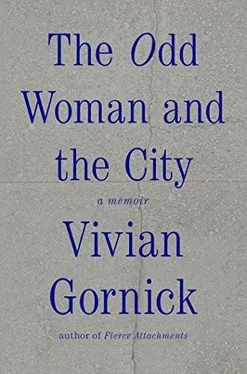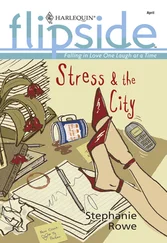“Tell me,” she said the next day, “how come they asked you . I mean how is it exactly that they ask someone like you.”
“Ma!” I said.
And the day after that: “Do you have to show the speech to them before you give it?” she asked. “I mean, a dean or someone, he’ll see what you’re going to say?”
“No…” I sighed. “I don’t have to show it to anyone.”
Her eyes rested silently on my face.
“Nu,” she said at last, “if they don’t like what you say all they’ll do is tell you to go home.”
Meaning: After all, it is America, they can’t kill you.
* * *
I learned early that life was either Chekhovian or Shakespearean. In our house there was no contest. My mother lay on a couch, in a half-darkened room, one arm flung across her forehead, the other pressed against her breast. “I’m lonely!” she cried, and from every quarter of the tenement, women, and men also, flapped about, trying to assuage an anguish of the soul they took to be superior. But she turned away, her eyes closed in frantic dissatisfaction. She wanted a solace of the spirit none of them could provide. They were not the right people. No one around her was the right person. There had been only one right person, and now he was dead.
She had elevated love to the status of the holy grail. To find love was not simply to have sexual happiness, it was to achieve a place in the universe. When she married my father, she told me, a cloud of obscurity lifted from her soul. That’s how she put it: a cloud of obscurity. Papa was magic: his look, his touch, his understanding. She leaned forward when she got to the end of this sentence. Understanding was the talismanic word. Without understanding, she said, she didn’t know she was alive; with understanding, she felt centered and in the world. In my father’s presence she responded with a depth she hadn’t known she possessed to poetry, politics, music, sex: everything. She closed her eyes dramatically. Everything. When he died, she said, “everything” went with him. The cloud over her soul returned, blacker than ever: now it blotted out the earth.
The depression was profound and, apparently, nonnegotiable, persisting undiminished and undiluted for years on end. She could not forget the absolute rightness of what had once been hers. Whatever was now being offered, it would not do. Nothing was ever again exactly the right thing, no one exactly the right one. Refusal of the approximate took on a life of its own.
I became my mother’s daughter. Very young, I was not able to find myself interesting without intelligent response. I required the company of minds attuned to my own, but no one around gave me back the words I needed to hear. I was forever telling the children on the block a story that had grown out of something that had just happened at school, in the grocery store, in the tenement building where I lived. I’d give them the narration, then I’d sum up, giving them the sentence that delivered the meaning of the story. After that I wanted someone to speak a sentence that would let me know my own had been received. Instead, eager looks evaporated, expressions turned puzzled or hostile, and, inevitably, someone said, “Whaddaya mean by that?”
I grew agitated, restless, and insulting, permanently aggrieved. “How can you say that!” I cried long before I could vote. I was beside myself with my mother’s sense of deprivation. It was as though I’d been cheated at birth of the Ideal Friend, and now all I could do was register the insufficiency of the one at hand.
I was never going to know what Keats knew before he was twenty-five, that “any set of people is as good as any other.” Now there was a Shakespearean life. Keats occupied his own experience to such a remarkable degree, he needed only the barest of human exchanges to connect with an inner clarity he himself had achieved. For that, almost anyone would do. He lived inside the heaven of a mind nourished by its own conversation. I would wander for the rest of my life in the purgatory of self-exile, always looking for the right person to talk to.
This dead end led quickly to high-minded moralizing. I became the only fourteen-year-old girl on the block who pronounced regularly on the meaning and nature of Love with a capital L. Real love, true love, right love. You knew instantly , I declared categorically, when you were in the presence of love. If you didn’t know, it wasn’t love. If it was , whatever the obstacles, you were to give yourself to it without question, because love was the supreme intensity, the significant exaltation. It was the certainty with which I rehearsed this litany, again and again, that marked me.
At the same time that I was pontificating about Love with a capital L, I was a girl who continually daydreamed herself up on the stage of some great auditorium, or on a platform in a public square, addressing a crowd of thousands, urging it to revolution. The conviction that one day I would have the eloquence and the vision to move people to such action was my secret thrill. Sometimes I’d feel puzzled about how I would manage life both as an agent of revolution and as a devotee of Love. Inevitably, then, a picture formed itself of me on the stage, my face glowing with purpose, and an adoring man in the audience waiting for me to come down into his arms. That seemed to cover all the bases.
As I passed into my late teens, this image in my head of myself leading the revolution began, mysteriously, to complicate itself. I knew, of course, that a significant life included real work — work done out in the world — but now I seemed to imagine that an Ideal Partner was necessary in order to do the work. With the right man at my side, I posited, I could do it all. Without the right man … but no, that was unthinkable. There would be no without the right man. The emphasis began to shift away from doing the work to finding the right man in order to do the work. Slowly but surely, finding the right man seemed to become the work.
In college, the girls who were my friends were literary. Every one of us identified either with George Eliot’s Dorothea Brooke, who mistakes a pedant for a man of intellect, or with Henry James’s Isabel Archer, who sees the evil-hearted Osmond as a man of cultivation. Those who identified with Dorothea were impressed by her prideful devotion to “standards”; those who didn’t thought her a provincial prig. Those who identified with Isabel admired her for the largeness of her emotional ambition; those who didn’t thought her dangerously naïve. Either way, my friends and I saw ourselves as potential variations of one or the other. The seriousness of our concerns lay in our preoccupation with these two fictional women.
The problem, in both Middlemarch and Portrait of a Lady , was that of the protagonist — beautiful, intelligent, sensitive — mistaking the wrong man for the right man. As a problem, the situation seemed entirely reasonable to all of us. We saw it happening every day of the week. Among us were young women of grace, talent, and good looks attached, or becoming attached, to men dull in mind or spirit who were bound to drag them down. The prospect of such a fate haunted all of us. We each shuddered to think that we might become such women.
Not me, I determined. If I couldn’t find the right man, I swore boldly, I’d do without.
For nearly ten years after college I knocked about in pursuit of the holy grail: Love with a capital L, Work with a capital W. I read, I wrote, I fell into bed. I was married for ten minutes, I smoked marijuana for five. Lively and animated, I roamed the streets of New York and Europe. Somehow, nothing quite suited. I couldn’t figure out how to get down to work, and needless to say, I couldn’t stumble on the right man. In time, a great lassitude overcame me. It was as though I’d fallen asleep on my feet and needed to be awakened.
Читать дальше












